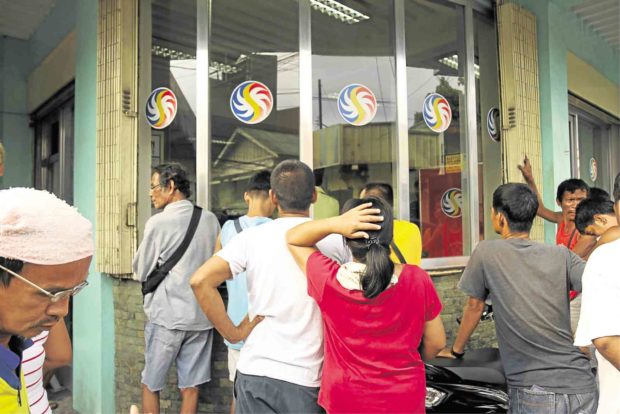
ELECTRONIC DRAW Bettors watch the electronic draw of Small Town Lottery in Lucena City. The Philippine Charity Sweepstakes Office says it is allowed by its charter to “hold and conduct sweepstakes, lotteries and other similar activities” to raise funds for charity. —DELFIN T. MALLARI JR.
The Philippine Charity Sweepstakes Office (PCSO) has been unlawfully running the Small Town Lottery (STL) since its operation is not covered by a legislative franchise, members of the House of Representatives said on Tuesday.
The lawmakers nevertheless said it would be unwise for the government to immediately shut down the state-sanctioned STL, which the Duterte administration has expanded to the Visayas and Mindanao provinces since 2016.
“The PCSO has no right to indulge in another form of gaming without a congressional franchise except the lotto,” House Minority Leader Danilo Suarez said at the joint hearing of the committees on games and amusement, and on public accounts.
Drive vs ‘jueteng’
Speaking with the Inquirer after the proceedings, Suarez said some 300,000 people could lose their jobs if the government would suddenly stop STL.
“Stopping the STL will have a huge impact,” he said. “Imagine 300,000 people losing their livelihood during the holiday season. That’s big.”
Introduced by the government in 1987 to stamp out the illegal numbers racket “jueteng,” STL has been used as a front of gambling syndicates for jueteng since the two games have similar mechanics, according to Church leaders and senators.
Earlier this year, Sen. Panfilo Lacson claimed that the government had been losing P48 billion a year to gambling lords who were granted STL franchises.
Suarez pointed out that even officials of the state gaming agency, which also operated sweepstakes, had admitted at the previous hearing that the STL operation was illegal.
“But we don’t want them to stop. We’re just saying that what you are doing is illegal. So let’s make it legal,” said the Quezon representative.
Abang Lingkod Rep. Joseph Stephen Paduano said it was for this reason that the House was helping the PCSO to amend its charter to make its STL operations legal.
Upon questioning by 1-Ang Edukasyon Rep. Salvador Belaro Jr., PCSO legal department head Anna Liza Inciong said the crafting of the STL was based on Republic Act No. 1169, the law that created the gaming regulator.
Lottery variant
Inciong said the law allowed the PCSO to “hold and conduct sweepstakes, lotteries and other similar activities” to raise funds for charity.
“The STL is a variant of the lottery, which is covered by the PCSO charter,” Inciong told Belaro.
But the party-list lawmaker pointed out that the law did not explicitly identify STL or local lotteries as one of the games that the PCSO may hold.
“By interpreting the law commonsensically, it should only refer to a national lottery. And if we speak of lottery, it should only refer to a national lottery system like the lotto,” Belaro said.
San Jose del Monte City Rep. Florida Robes questioned the PCSO decision to set aside P46 million for a private firm it contracted as consultant for its P10.9-billion online lottery project.
“Unfortunately, while [you’re willing to] pay P46 million to a consultant, you are only providing P10,000 to indigent Filipinos. That’s the truth,” Robes said.